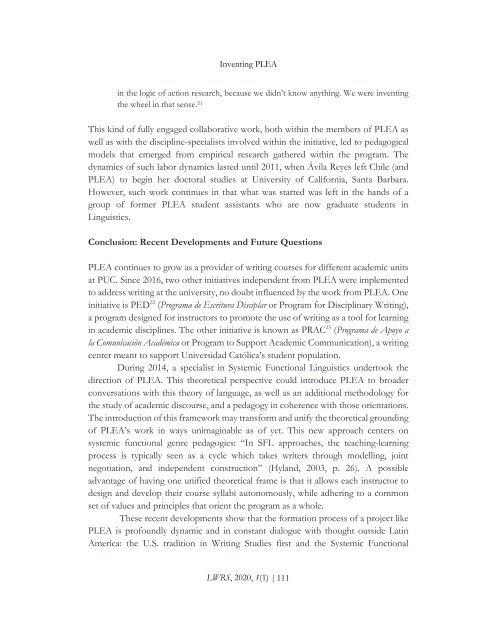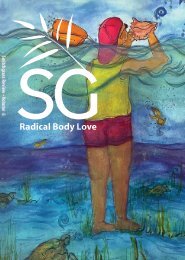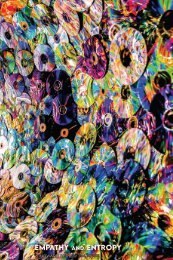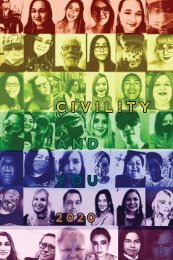LWRS June 2020 Volume 1, Issue 1
Inaugural Issue co-edited by Yndalecio Isaac Hinojosa and Isabel Baca
Inaugural Issue co-edited by Yndalecio Isaac Hinojosa and Isabel Baca
Create successful ePaper yourself
Turn your PDF publications into a flip-book with our unique Google optimized e-Paper software.
Inventing PLEA<br />
in the logic of action research, because we didn’t know anything. We were inventing<br />
the wheel in that sense. 21<br />
This kind of fully engaged collaborative work, both within the members of PLEA as<br />
well as with the discipline-specialists involved within the initiative, led to pedagogical<br />
models that emerged from empirical research gathered within the program. The<br />
dynamics of such labor dynamics lasted until 2011, when Ávila Reyes left Chile (and<br />
PLEA) to begin her doctoral studies at University of California, Santa Barbara.<br />
However, such work continues in that what was started was left in the hands of a<br />
group of former PLEA student assistants who are now graduate students in<br />
Linguistics.<br />
Conclusion: Recent Developments and Future Questions<br />
PLEA continues to grow as a provider of writing courses for different academic units<br />
at PUC. Since 2016, two other initiatives independent from PLEA were implemented<br />
to address writing at the university, no doubt influenced by the work from PLEA. One<br />
initiative is PED 22 (Programa de Escritura Disciplar or Program for Disciplinary Writing),<br />
a program designed for instructors to promote the use of writing as a tool for learning<br />
in academic disciplines. The other initiative is known as PRAC 23 (Programa de Apoyo a<br />
la Comunicación Académica or Program to Support Academic Communication), a writing<br />
center meant to support Universidad Católica’s student population.<br />
During 2014, a specialist in Systemic Functional Linguistics undertook the<br />
direction of PLEA. This theoretical perspective could introduce PLEA to broader<br />
conversations with this theory of language, as well as an additional methodology for<br />
the study of academic discourse, and a pedagogy in coherence with those orientations.<br />
The introduction of this framework may transform and unify the theoretical grounding<br />
of PLEA’s work in ways unimaginable as of yet. This new approach centers on<br />
systemic functional genre pedagogies: “In SFL approaches, the teaching-learning<br />
process is typically seen as a cycle which takes writers through modelling, joint<br />
negotiation, and independent construction” (Hyland, 2003, p. 26). A possible<br />
advantage of having one unified theoretical frame is that it allows each instructor to<br />
design and develop their course syllabi autonomously, while adhering to a common<br />
set of values and principles that orient the program as a whole.<br />
These recent developments show that the formation process of a project like<br />
PLEA is profoundly dynamic and in constant dialogue with thought outside Latin<br />
America: the U.S. tradition in Writing Studies first and the Systemic Functional<br />
<strong>LWRS</strong>, <strong>2020</strong>, 1(1) | 111





